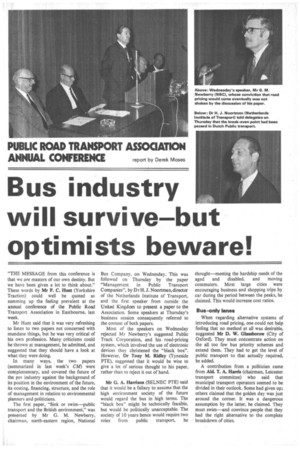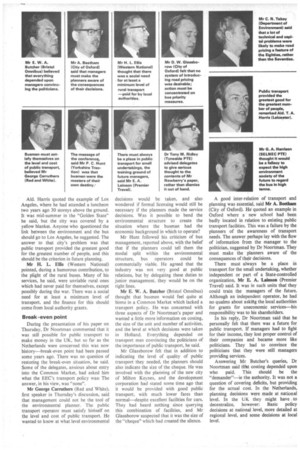Bus industry will survive but optimists beware!
Page 49

Page 50

If you've noticed an error in this article please click here to report it so we can fix it.
"THE MESSAGE from this conference is that we are masters of our own destiny. But we have been given a lot to think about." These words by Mr P. C. Hunt (Yorkshire Traction) could well be quoted as summing up the feeling prevalent at the annual conference of the Public Road Transport Association in Eastbourne, last week.
Mr Hunt said that it was very refreshing to listen to two papers not concerned with mundane things, but he was very critical of his own profession. Many criticisms could be thrown at management, he admitted, and suggested that they should have a look at what they were doing.
In many ways, the two papers (summarized in last week's CM) were complementary, and covered the future of the psv industry against the background of its position in the environment of the future, its costing, financing, structure, and the role of management in relation to environmental planners and politicians.
The first paper, "Sink or swim—public transport and the British environment," was presented by Mr G. M. Newberry, chairman, north-eastern region, National
Bus Company, on Wednesday. This was followed on Thursday by the paper "Management in Public Transport Companies", by Dr H. J. Noortman, director of the Netherlands Institute of Transport, and the first speaker from outside the United Kingdom to present a paper to the Association. Some speakers at Thursday's business session consequently referred to the context of both papers.
Most of the speakers on Wednesday rejected Mr Newberry's suggested Public Track Corporation, and his road-pricing system, which involved the use of electronic devices they christened the "black box". However, Dr Tony M. Ridley (Tyneside PTE), suggested that it would be wise to give a lot of serious thought to his paper, rather than to reject it out of hand.
Mr G. A. Harrison (SELNEC PTE) said that it would be a fallacy to assume that the high environment society of the future would regard the bus in high terms. The "black box" might be technically feasible, but would be politically unacceptable. The society of 10 years hence would require two roles from public transport, he
thought—meeting the hardship needs of the aged and disabled, and moving commuters. Most large cities were encouraging business and shopping trips by car during the period between the peaks, he claimed. This would increase cost ratios.
Bus–only lanes When regarding alternative systems of introducing road pricing, one could not help feeling that no method at all was desirable, suggested Mr D. W. Glassborow (City of Oxford). They must concentrate action on the all too few bus priority schemes and extend them. They had to get the level of public transport to that actually required, he added.
A contribution from a politician came from Aid. T. A. Harris (chairman, Leicester transport committee) who said that municipal transport operators seemed to be divided in their outlook. Some had given up; others claimed that the golden day was just around the corner. It was a dangerous assumption by the latter, he claimed. They must swim—and convince people that they had the right alternative to the complete breakdown of cities.
Aid. Harris quoted the example of Los Angeles, where he had attended a luncheon two years ago 30 storeys above the ground. It was mid-summer in the "Golden State" he said, but the city was covered by a yellow blanket. Anyone who questioned the link between the environment and the bus should go to Los Angeles, he suggested. The answer to that city's problem was that public transport provided the greatest good for the greatest number of people, and this should be the criterion in future planning.
Mr IL L Ellis (Western National) pointed, during a humorous contribution, to the plight of the rural buses. Many of his services, he said, were unviable rural ones which had never paid for themselves, except possibly during the war. There was a social need for at least a minimum level of transport, and the finance for this should come from local authority grants.
Break-even point
During the presentation of his paper on Thursday, Dr Noortman commented that it was still possible for public transport to make money in the UK, but so far as the Netherlands were concerned this was now history—break-even point had been passed some years ago. There was no question of restoring the break-even situation, he said. Some of the delegates, anxious about entry into the Common Market, had asked him what the EEC's transport policy was The answer, in his view, was "none".
Mr George Carruthers (Red and White), first speaker in Thursday's discussion, said that management could not be the tool of the environmental planner. The public transport operator must satisfy hiniself on the level and cost of public transport. He wanted to know at what level environmental
decisions would be taken, and also wondered if formal licensing would still be necessary if the planners made the service decisions. Was it possible to bend the environmental structure to create the situation where the busman had the economic background in which to operate?
Mr Hunt followed his criticism of bus management, reported above, with the belief that if the planners could tell them the modal split within the environmental structure, bus operators could be commercially viable. He agreed that the industry was not very good at public relations, but by delegating these duties to junior management, they would be on the right lines.
Mr E. W. A. Butcher (Bristol Omnibus) thought that busmen would feel quite at lime in a Common Market which lacked a transport policy. He was concerned with three aspects of Dr Noortman's paper and wanted a little more information on costing, the size of the unit and number of activities, and the level at which decisions were taken in Holland. Everything depended on transport men convincing the politicians of the importance of public transport, he said.
Mr Glassborow felt that in addition to indicating the level of quality of public transport they needed, the planners should also indicate the size of the cheque. He was involved with the planning of the new city of Milton Keynes, and the development corporation had stated some time ago that it would be provided with good public transport, with much lower fares than normal—despite excellent facilities for cars. They had heard nothing since querying this combination of facilities, and Mr Glassborow suspected that it was the size of the "cheque" which had created the silence.
A good inter-relation of transport and planning was essential, said Mr A. Beetham (City of Oxford). He quoted an example in Oxford where a ' new school had , been badly located in relation to existing public transport facilities. This was a failure by the planners of the awareness of transport needs. The answer.perhaps lay with the flow of information from the manager to the politician, suggested by Dr Noortman. They must make the planners aware of the consequences of their decisions. There must always be a place in transport for the small undertaking, whether independent or part of a State-controlled organization, Mr E. A. 1Lainsoit (Premier Travel) said. It was in such units that they could train the managers of the future. Although an independent operator, he had no qualms about asking the local authorities for grants for uneconomic services—his responsibility was to his shareholders.
In his reply, Dr Noortman said that he personally felt that there was a future for public transport. If managers had to fight for their income, they lost proper control of their companies and became more like politicians. They had to convince the politicians that they were still managers providing services.
Answering Mr Butcher's queries, Dr Noortman said thitt costing depended upon who paid. This should be the "demander"—ie the authority. It was not a question of covering deficits, but providing for the actual cost. In the Netherlands, planning decisions were made at national level. In the UK they might have to decentralize, however: Basic policy decisions at national level, more detailed at regional level, and some decisions at local level.
































































































